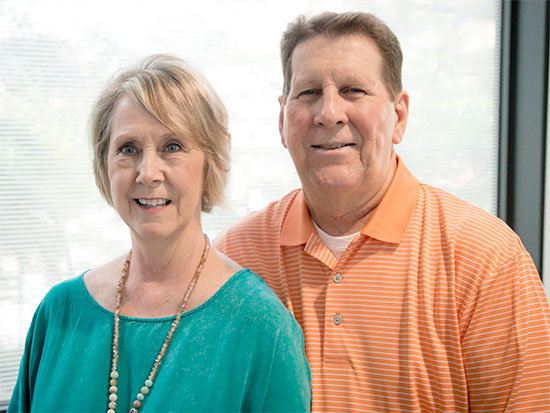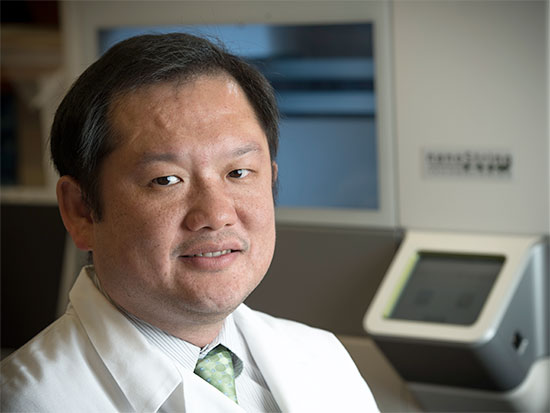 Teresa and Mickey NunnMickey Nunn mowed his grass this summer. That might not seem like much, but it was the first time in more than three years. The 66-year-old from a small town near Gadsden, Alabama, was diagnosed with prostate cancer in 2008. It got worse over the years, and the traditional therapies just were not working. He underwent 42 radiation treatments and 17 rounds of chemotherapy.
Teresa and Mickey NunnMickey Nunn mowed his grass this summer. That might not seem like much, but it was the first time in more than three years. The 66-year-old from a small town near Gadsden, Alabama, was diagnosed with prostate cancer in 2008. It got worse over the years, and the traditional therapies just were not working. He underwent 42 radiation treatments and 17 rounds of chemotherapy.
“Nothing was working,” Nunn said. “I was nearly bedridden, in pain and not getting any better.”
His PSA scores were sky-high. PSA, or prostate-specific antigen, is a protein produced by the prostate gland. The PSA test indicates the amount of the protein in a man’s blood — a score higher than 4 is considered a risk factor for prostate cancer. Even after all that radiation and chemotherapy, Nunn’s PSA score was 99.
Nunn was a patient at the University of Alabama at Birmingham Comprehensive Cancer Center. He did not know it, but he was about to benefit from a new research program in precision oncology — using the genetic makeup of a patient’s tumor to determine the optimum therapy for that patient.
“Precision oncology is a relatively new concept, and it is changing how we provide cancer care,” said Eddy Yang, M.D., Ph.D., professor and vice chair of translational sciences in the UAB Department of Radiation Oncology, deputy director of the Hugh Kaul Precision Medicine Institute, and director of the UAB Molecular Tumor Board. “We used to treat a patient based on the type of tumor — one size fits all. With precision oncology, we treat based on the genetic signature of that tumor, not necessarily its location in the body.”
UAB expanded its precision oncology efforts in May 2017 with a partnership with Strata Oncology to provide tumor profiling for patients with advanced or rare cancers. In some cases where the tumor profiling does not yield a treatment match, further analysis could be performed with another test using blood from the patient.
“Tumors can shed cells and DNA into the blood stream, so we can send a blood sample for analysis,” Yang, a senior scientist in the UAB Comprehensive Cancer Center, said. “It’s a simple blood draw and less invasive than a biopsy. We then look for key mutations or changes in the copy number of cancer driver genes. We can then turn to medications that are known to target these mutations.”
 Eddy Yang, M.D., Ph.D.Early in 2017, Nunn saw a TV news story about such testing and told his wife he would be interested in participating if they could find where the work was being done. She promised to make some calls, but Yang’s office beat her to it. Knowing that Nunn’s cancer was not responding to traditional therapy, they called to tell him he was a candidate for UAB’s precision oncology trials.
Eddy Yang, M.D., Ph.D.Early in 2017, Nunn saw a TV news story about such testing and told his wife he would be interested in participating if they could find where the work was being done. She promised to make some calls, but Yang’s office beat her to it. Knowing that Nunn’s cancer was not responding to traditional therapy, they called to tell him he was a candidate for UAB’s precision oncology trials.
Following analysis of Nunn’s blood, Yang determined that his tumor, based on its genetic signature, might respond to a drug already on the market for ovarian cancer, olaparib, marketed under the name Lynparza.
“I had already told my doctors I was willing to try any new medicine they suggested,” Nunn said. “They told me I matched well to this ovarian cancer drug, and I said ‘let’s do it.’”
So they tried it. And it is working.
Nunn reports his PSA number dropped from 99 to 64 after just one month on olaparib. By mid-summer, it had fallen to just over 10.
“I feel the best I have in 10 years,” Nunn said. “I used to have bad back pain, but I was able to stop taking my pain medicine just three days after starting on olaparib. Now I can get out, work in the yard and take care of the house like I used to.”
Nunn says the whole experience has been a godsend to him.
“I really consider myself blessed, to have had the opportunity to take part in this research effort and to see the effect the drug has had on reducing my PSA numbers,” he said. “This all goes through God and I believe it was all meant to be.”
| Three new UAB entities are helping Yang push to make precision oncology the new standard of care. UAB created the Hugh Kaul Precision Medicine Institute, the UAB Informatics Institute and the UAB HudsonAlpha Center for Genomic Medicine in 2015. All three are paving the way for significant growth and acceleration of personalized medicine in Alabama, the region and beyond. |
“In the past, when we began testing a new drug or therapy, we typically saw a response rate in Phase 1 studies of 10, maybe 20 percent of patients,” Yang said. “With genetic-based studies, we are seeing a drug response rate much higher in patients who match to therapy, which is very exciting.”
Yang says precision medicine is complicated. Informatics is the key, as it requires a lot of data.
“We need data about the tumor and about the patient,” he said. “We need information on the living environment, diet and other co-morbidities. We need to expand the knowledge base and find the necessary ways to integrate all this information in our treatment strategies so we can more effectively treat each individual patient.”
Three new UAB entities are helping Yang push to make precision oncology the new standard of care. UAB created the Hugh Kaul Precision Medicine Institute, the UAB Informatics Institute and the UAB HudsonAlpha Center for Genomic Medicine in 2015. All three are paving the way for significant growth and acceleration of personalized medicine in Alabama, the region and beyond.
These programs, housed in the School of Medicine, are pulling together scientists and physicians from a variety of disciplines to bear on a multitude of diseases and disorders. The goal is to expand research into the genetic factors related to diseases and create precisely targeted treatments based on a patient’s individual genetic makeup.
“I like where things are going,” Yang said. “Perhaps the most important key in this groundbreaking effort is that the physicians and the patients will be equipped with information upfront and sooner about their cancer, and that can go a long way.”